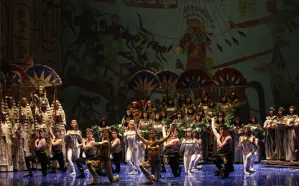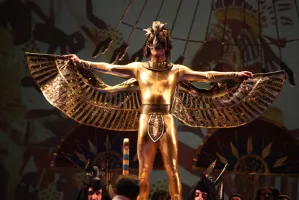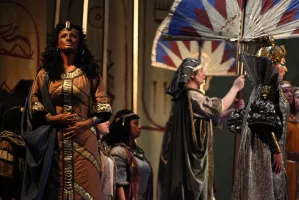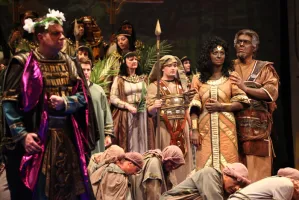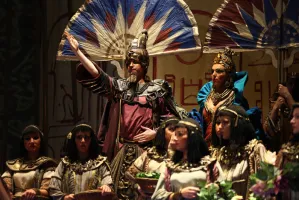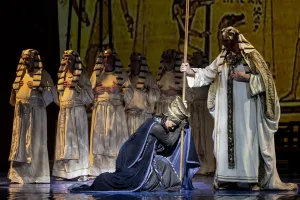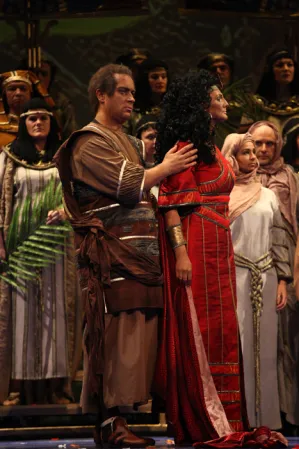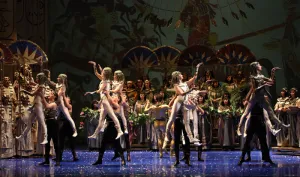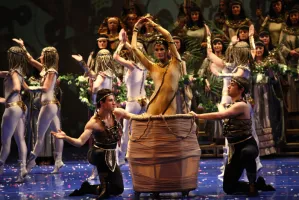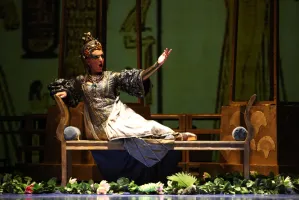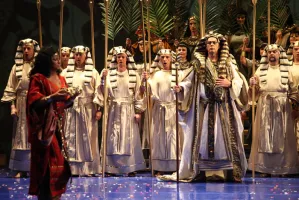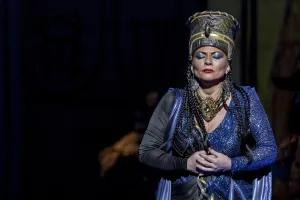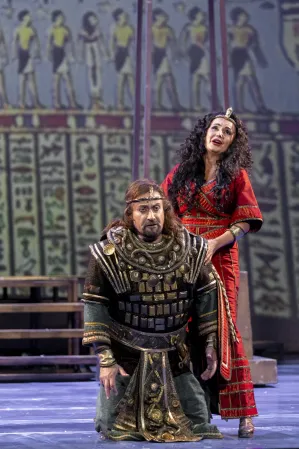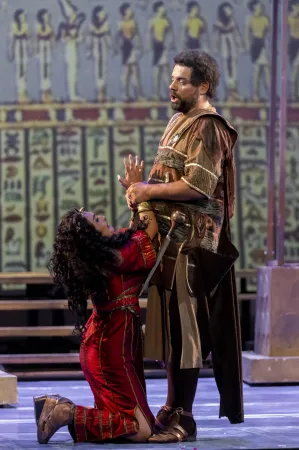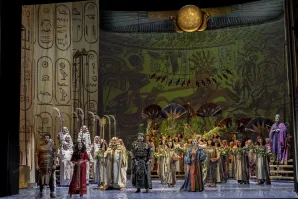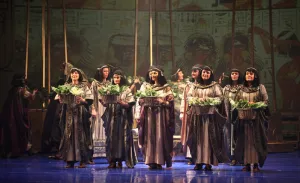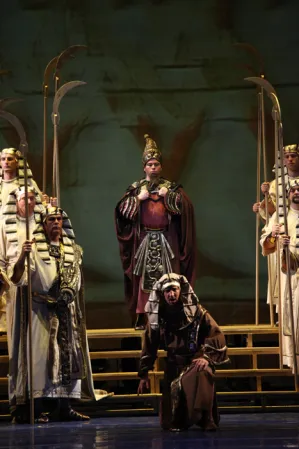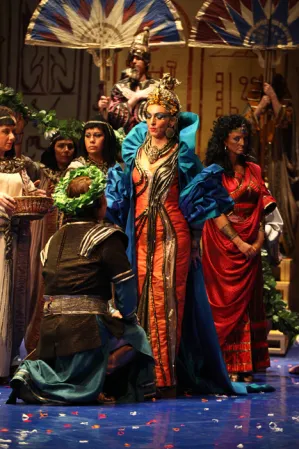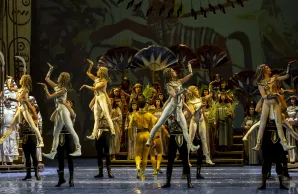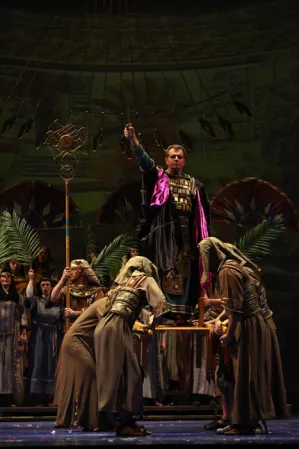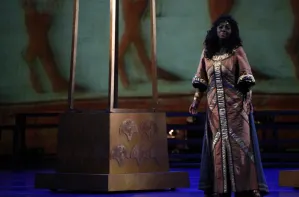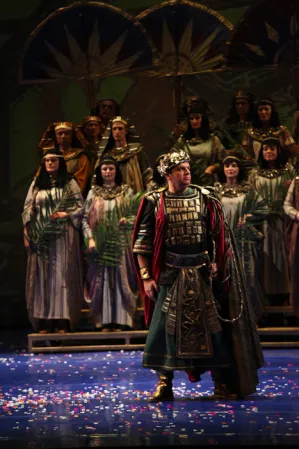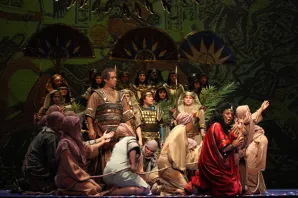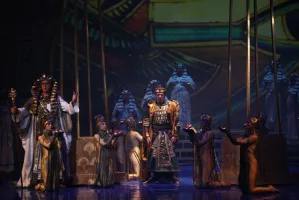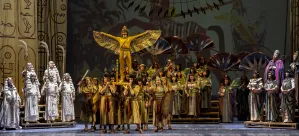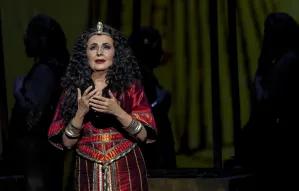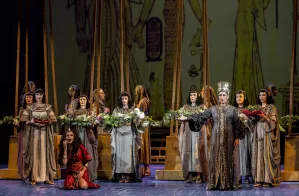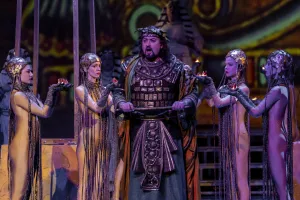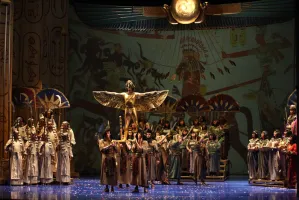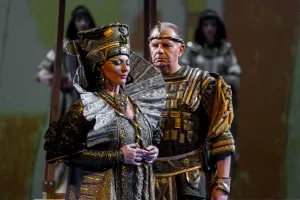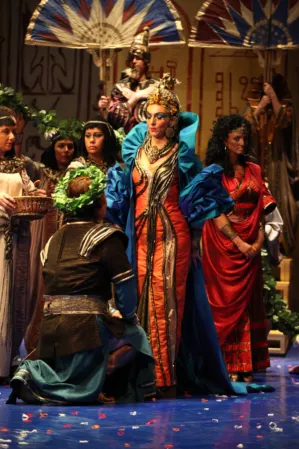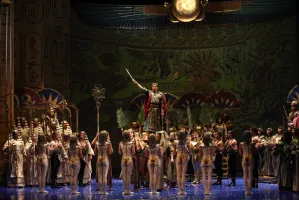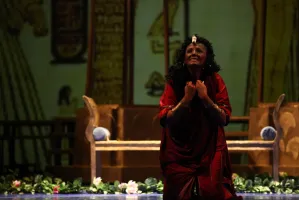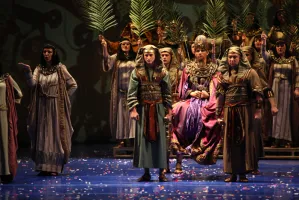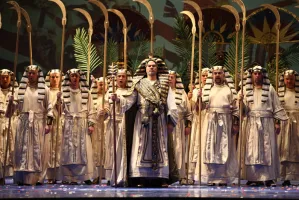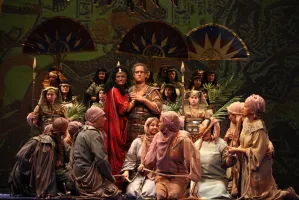Aida
opera by Giuseppe Verdi

Verdi's Magnificent Spectacle
Verdi's opera Aida was performed as part of the celebration of the opening of the Suez Canal. That's how the legend goes. However, the real story is a bit different. The Egyptian khedive (viceroy) Ismail Pasha, a great admirer of Verdi's work, decided to build an opera house in Cairo and to link its opening with a grandiose event - the opening of the Suez Canal (1869), which would improve trade relations between Europe and Asia. He asked Verdi to write a hymn for the inauguration of the opera house, however, the composer politely refused. The Cairo Opera House opened with Verdi's Rigoletto, and in the next few weeks Il Trovatore, La Traviata, Ernani and A Masked Ball were performed. Ismail Pasha did not give up the idea of commissioning an original work from the grand maestro, this time an opera about Ancient Egypt. Thus he hired Auguste Mariette, a French archaeologist who was in the service of the Egyptian government and who founded the Egyptian Museum in Cairo, to provide a scenario for the libretto. Mariette sent his story to a friend, the director of the Opéra Comique in Paris, Camille du Locle, Verdi's collaborator and confidant.
However, the composer was adamant, until du Locle sent him Mariette's scenario. Verdi was thrilled with it. He had the impression as if the author was someone with theatrical experience. He could not resist a good story, which fully met the requirements of the theatre stage, whose dramatic situations have always been the main driver of his inspiration. Because, as Burton Fisher says, “In opera, the composer is the dramatist who uses the expressive power of his music to express intense human conflicts”, and in Aida, it is precisely the conflicts, both between the protagonists and those personal, internal ones, that are the main bearers of the entire drama.
In the whirlwind of the war between Egypt and Ethiopia, there is a couple in love - Aida, a captured Ethiopian princess, and Radamès, an Egyptian general whose relationship in such circumstances seems unattainable because politically powerful pharaoh's daughter Amneris is also in love with Radamès. Verdi will show their mutual relationships with unforgettable melodies, but also their inner monologues full of fear, indecision, passion, despair, anger, characters torn between their duty to their country and their personal desires. Thus, it will create an extremely demanding opera for the singers whose famous arias and duets with their long phrases require long breaths, a wide vocal range and technical skill to perform very demanding high pitches. It was as if the composer wanted, by showing all the power of the Egyptian kingdom, to also demonstrate all the power of the human voice.
Nevertheless, Egypt takes the central place in the opera, a powerful civilisation that fascinates with its culture and art even today and whose splendour Verdi depicted by creating a real opera spectacle with the famous Triumphal Scene but also a mystical atmosphere imbued with the rites of Egyptian priests.
From the moment Verdi agreed to compose Aida, everything happened very quickly: du Locle composed a prose libretto in French from Mariette's script, and then Antonio Ghislanzoni wrote it in verse in Italian. All this according to Verdi's detailed instructions. Aida was completed within four months. Since Verdi's condition was that he would not have to go on such a long trip to Egypt, the opera was completely prepared in Paris. Aida was performed in Cairo on December 24, 1871, two years after the opening of the Suez Canal, with tremendous success (to the satisfaction of Ismail Pasha) and Verdi was awarded the title of Commander of the Ottoman Order.
Vanja Kosanić
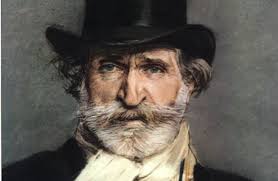 GIUSEPPE VERDI
GIUSEPPE VERDI
(Important years and periods)
October 10, 1813 Verdi is born in Le Roncole, Parma. 1832-1835 He studies music with V. Lavigna in Milan. 1839 His debut at La Scala with OBERTO, Conte di San Bonifacio. 1842 Premiere of NABUCCO, opera that brought him international success. 1843 Premiere of the opera THE LOMBARDS ON THE FIRST CRUSADE, in which, as well as in the next two, Verdi expresses ideas of patriotism and national-liberation. 1844 Premiere of the opera ERNANI - Verdi speaks from “the very soul of the people” striving for freedom and unification; he gets a nickname „Maestro della Revolutione“ („Viva Verdi - VivaVittorio Emanuele Re d’Italia!“). 1845 Premiere of the opera JEANNE D’ARC (based on Schiller). 1847 Premiere of the opera MACBETH (based on Shakespeare). 1849 Premiere of the opera LUISA MILLER (based on Schiller). 1851-1853 The most prolific period in his career, he writes RIGOLETTO (based on V. Hugo), IL TRAVATORE and LA TRAVIATA (based on A. Dumas, fils) – pieces demonstrating his gift for shaping the characters and creating the dramatic plot through the unique musical-dramatic line. 1855-1867 Under the influence of the French Opera, he writes pieces with mass scenes and big spectacles: THE SICILIAN VESPERS, SIMON BOCCANEGRA, A MASKED BALL, THE POWER OF DESTINY, DON CARLOS. 1871 The highest point of his career: The Cairo premiere of AIDA – Verdi’s most complex opera, both for the harmony between musical shape and dramatic content, as well as for virtuosity in singing parts and in orchestration. 1887 Premiere of the opera OTHELLO (based on Shakespeare). 1893 Premiere of the opera FALSTAFF (based on Shakespeare). January 27, 1901 Verdi dies in Milan.
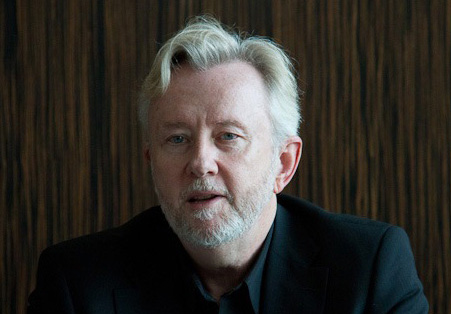 PETER LEONARD
PETER LEONARD
Peter Leonard has been Intendant (Artistic Director) of the Volkstheater Rostock and the North German Philharmonic since 2008. He has guest conducted orchestras throughout North America, including the New York Philharmonic. He has conducted dozens of German orchestras as well. Other international appearances have included Mexico City’s famed OrquestaFilarmonica de la UNAM, the Belgrade Philharmonic and the Pusan Philharmonic. An active opera conductor, Mr. Leonard’s love for singing and singers informs every moment of his work, so that his interpretations of the Italian masters (especially Verdi and Donizetti) have been particularly prized. To critical acclaim, he also led the world premiere of the complete version of BohuslavMartinu’spathbreaking “film opera” Les troissouhaits.Among the many composers whose music Mr. Leonard has premiered are Copland, Crumb, Egk, Finney, Holst, Hovhaness, Korn, Martinu, Maw, Pasatieri, Rorem, Thomas, Thorne, Wilder and Zwilich.At the close of the 2001-2002 season, Peter Leonard completed a distinguished seven-year tenure as General Music Director of the City of Augsburg, Germany. During this time, he presided over world and German premieres of both opera and symphonic repertoire, highlighted by a path-breaking new production of Wagner’s Ring des Nibelungen. Bravo Cable Network and Ovation Magazine have honored him with commendations for outstanding contributions to American musical life, and Stereo Reviewnamed one of his discs a “Recording of Special Merit.”Peter Leonard has recorded for Albany, CRI, Opus One, Painted Smiles, Premiere Recordings and The Louisville Orchestra’s First Edition Records. Born and raised in the Boston area, Peter Leonard moved to New York to study at The Juilliard School, earning both Bachelor’s and Master’s degrees. He was chosen by the celebrated Jean Morel for the school’s highly selective conducting program. He was the recipient of prestigious awards for advanced study at the Aspen Music Festival, Salzburg’s Mozarteum, Tanglewood and Bayreuth.
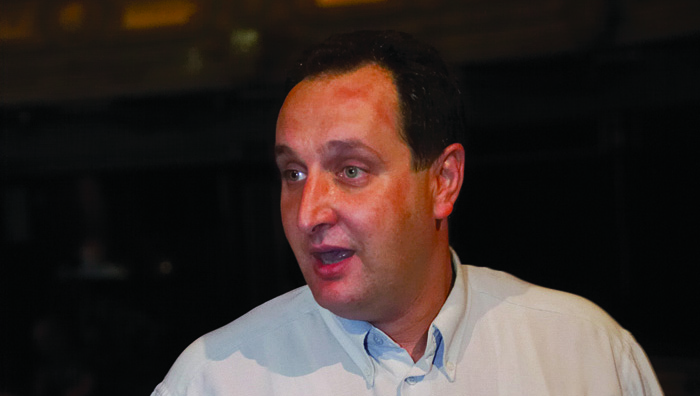 OGNIAN DIMITROV DRAGANOFF
OGNIAN DIMITROV DRAGANOFF
Ognjan Dimitrov Draganov was born in 1964, in Stara Zagora, Bulgaria. He received his Master’s Degree from the Department of Opera Directing at the Bulgarian Music Academy in 1997. In his career, he was engaged at the following positions: The Sofia National Opera as a stage manager (1986–1991), assistant director (for Albert-Andre Lheureux and Plamen Kartaloff, 1989–1996), opera stage director at the Sofia National Opera (1996–2002), vice-manager of the Sofia National Opera (1998–2002), general manager of the Balkan Opera Network-association (2003–05) and since 2005, general Manager of Music House V’AMO and New Europe Symphony Orchestra and since 2012, opera stage director of State Opera Ruse, Bulgaria. He has directed numerous opera productions in Bulgaria, Greece, Rumania, Macedonia, Holland, Belgium, Italy, Bosnia and Herzegovina, Serbia, Brazil, Columbia. His productions: G. Verdi – Rigoletto (“Euro Stage” Touring Company, Holland; Sarajevo National Opera), Il Trovatore (”Euro Stage” Touring Company and Оpera Enshede, Holland; Opera Festival in Belem, Brazil), Aida (”Euro Stage” Touring Company; Timisoara National Opera), Nabucco (Macedonian National Opera; National Theatre Opera in Belgrade), La Traviata (Oss , Holland; Timisoara National Opera); G. Pucini – Madam Butterfly (Theatre “Luxor”, Rotterdam), La Boheme (Opera “Ovideo”, Constanca), Tosca (Macedonian National Opera; National Opera in Timisoara; Iasi National Opera, Romania); A. Jossifov – Max and Moritz, Maya the bee, Pinocchio for Sofia National Opera. G. Donizetti – Lucia di Lammermoor (”Euro Stage” Touring Company; Sofia National Opera; Bucharest National Opera; National Theatre in Madeline, Columbia), L’Elisir d’amore (Enshede, Holland; Co production CEE Musiktheater Vienna–Timisora–Sarajevo), Don Pasqualle (Sarajevo National Opera); V. Bellini – Norma (National Opera Bogotá, Columbia); G. B. Pergolesi – La Serva padrona (Belem Opera Festival, Brazil); B. Bartok – Duke Bluebeard’s Castle (Stara Zagora State Opera); Johann Strauss – Die Fledermaus (State Opera Konstanza, Romania)
SYNOPSIS
ACT ONE
Scene 1: The throne room at the royal palace in Memphis
Ramfis, the high priest of Egypt, tells Radamès that the Ethiopians have invaded Egypt. Ramfis goes to ask the goddess Isis who will lead the Egyptian troops in the war against Ethiopia. Radamès would be happy if it were him (Radamès’s aria). The daughter of the Egyptian king, Amneris, is unhappily in love with him. She senses that he secretly loves Aida (a terzetto of Amneris, Radamès, Aida). At the ceremonial reception at the king's palace, a messenger announces that the Ethiopian army is led by the Ethiopian king Amonasro himself. Aida, an Ethiopian in love with Radamès and a slave of Amneris, does not reveal to anyone that this is her father. The king announces that Radamès has been chosen as the leader of the Egyptian army. Aida is torn between her love for Radamès and her motherland (Aida's aria).
Scene 2 – The temple
The priestess, the priests, Ramfis and Radamès pray to the god Ptah to bless the weapons of the Egyptian warriors and bring them victory over the Ethiopians.
ACT TWO
Scene 1: The chamber of Princess Amneris
Amneris prepares to ceremoniously welcome the triumphant Radamès. In a conversation with Aida, by falsely telling her that Radamès has died, she confirms her suspicions that her slave is in love with Radamès. Jealous Amneris decides to humiliate Aida in front of everyone (a duet of Aida and Amneris).
Scene 2 – The town’s square
Triumphal march. Warriors come to the square, led by Radamès. The king crowns Radamès with a victor’s wreath, and Aida sees her father Amonasro among the captives. He signals to his daughter not to reveal his identity as he presents himself as one of the Ethiopian army leaders. Amonasro pleads with the king to be merciful to the captives, but Ramfis and the priests call for their death. The king decides to keep Aida and Amonasro in custody and free the other captives.
A wedding feast is being prepared - the king gives Princess Amneris's hand to the brave Radamès. Amneris triumphs over Aida, who is devastated by pain.
ACT THREE
In front of the Temple of Isis on the banks of the Nile
Ramfis takes Amneris into the temple where she is to spend the entire eve before her wedding in prayer. Aida arrives, expecting Radamès and worries that he will say goodbye to her. She grieves and thinks about her homeland (Aida's aria). Amonasro, who has learned of his daughter's secret love, appears and demands that she find out from Radamès which route of the Egyptian army will take in their next campaign against Ethiopia. Aida refuses, but her father invokes her sense of duty towards the souls of all those who died, including her mother. Hearing Radamès coming, Amonasro hides and listens to their conversation. Overwhelmed with joy that they meet again, Radamès promises Aida that, as soon as he returns from the new campaign to Ethiopia, he will ask the king to give him Aida and then they will run away together (a duet of Aida and Radamès). She tries to convince him to flee instantly, and when he reluctantly agrees, Aida makes him reveal the route the Egyptian army will take - through the narrow passage near Napata. Then Amonasro emerges before them from his hiding place and reveals his identity. Radamès realizes that he has betrayed his country, and Amneris, who came out of the temple, also hears his words. Aida and Amonasro flee, Radamès surrenders himself to the High Priest.
ACT FOUR
Scene 1 – A hall in the Temple
Amneris awaits the trial of Radamès and prays to the gods to save him. She manages to get a moment alone with him and once again begs him to come back to her. He has no desire to live, as he believes that Aida is dead, but Amneris assures him that only Amonasro was killed at the temple and Aida is missing. She asks Radamès to renounce Aida, and then she will plead with the king to pardon him, but he refuses because he loves Aida (Amneris and Radamès’s duet). The priests gather at the temple for Radamès’ trial, and Amneris is desperate. With greatest anguish, she listens to Radamès’s refusal to answer the priests’ accusations and thus signs a death sentence for himself - he will be buried alive.
Scene 2 - The vault under the temple
Radamès was buried alive, but Aida had already hidden in the tomb. They die together, while in the temple Amneris prays for the salvation of their souls (a duet of Aida and Radamès).
Premiere performance
Premiere 10. April 2013. / Main stage
Opera in four acts (7 scenes) | Libretto Antonio Ghislanzoni
First performance: in Cairo on 24 December 1871, on occasion of the opening of the Suez Canal
Conductor Peter Leonard, g.a. / Đorđe Pavlović
Director Ognian Dimitrov Draganoff, g.a.
Set Designers Dejan Miladinović & Miraš Vuksanović
Costume Designer Milanka Berberović
Costume Designer Associate Katarina Grčić Nikolić
Choreographer Konstantin Kostjukov
Selection Of Video Materials Dejan Miladinović
Video Production Petar Antonović
Premiere Cast:
The King Of Egypt Stefan Pavlović / Mihailo Šljivić
Amneris, His Daughter Jelena Vlahović / Nataša Jović Trivić / Dragana Del Monako / Jadranka Jovanović
Aida, Slave Jasmina Trumbetaš Petrović / Ana Rupčić / Sanja Kerkez
Radames, Egyptian Warrior Janko Sinadinović / Hon Li / Dušan Plazinić
Ramfis, Egyptian High Priest Ivan Tomašev / Nenad Jakovljević / Slavko Sekulić
Amonasro, The King Of Ethiopia, Aida’s Father Miodrag D. Jovanović / Aleksandar Stamatović
Messenger Nenad Čiča / Danilo Stošić
Priestess Ivanka Raković Krstonošić / Biljana Soldo / Tatjana Mitić / Marija Mitić Vasić
Priests, priestesses, solders, Ethiopian slaves, Egyptian people
With Orchestra, Choir, Ballet Company and extras of The National Theatre in Belgrade
Ballet Soloists Milica Jević, Nada Stamatović, Smiljana Stokić / Ivana Savić, Olivera Gavrilov, Tijana Šebez (III Scene)
Milica Jević, Miloš Marjan / Ivana Savić, Lloyd Petchey (IV Scene)
With Participation Of Students Of “Lujo Davičo” Ballet School In The Third Scene
AssIstant Choreographer Milica Bezmarević
Students Trained By Lidija Pavlović
The action takes place in Memphis and Thebes, in the time of the Pharaohs
Chorus Master Đorđe Stanković
Concert Masters Edit Makedonska / Vesna Jansens
Stage Music Đorđe Stanković
Music Associates Srđan Jaraković, Ivan Jovanović, Nevena Živković, Nada Matijević, Tatjana Ščerbak Pređa
Stage Managers Branislava Pljaskić, Ana Milićević
Prompters Silvija Pec, Biljana Manojlović
Producers Maša Milanović Minić, Snježana Vujasinović Đorđević
Libretto subtitles translation Dejan Mitrović
Deputy Stage Director Ivana Dragutinović Maričić
Assistant Director Branislava Pljaskić
Make-Up Dragoljub Jeremić
Lighting operator Srđan Mićević
Stage Crew Chief Zoran Mirić
Sound operator Tihomir Savić
SETS AND COSTUMES WERE MANUFACTURED IN THE WORKSHOPS OF THE NATHIONAL THEATRE


